外研版(2019)必修 第二册Unit 1 Food for thought Starting out & Understanding ideas课件(共36张)
文档属性
| 名称 | 外研版(2019)必修 第二册Unit 1 Food for thought Starting out & Understanding ideas课件(共36张) | 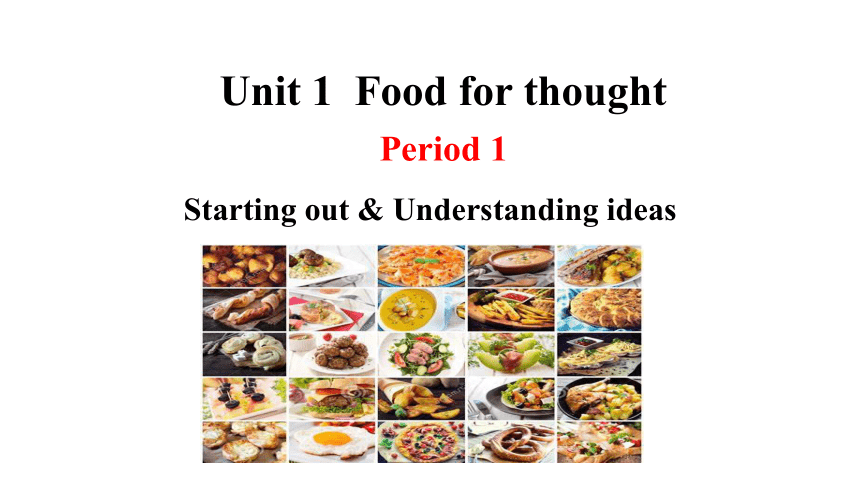 | |
| 格式 | ppt | ||
| 文件大小 | 12.1MB | ||
| 资源类型 | 教案 | ||
| 版本资源 | 外研版(2019) | ||
| 科目 | 英语 | ||
| 更新时间 | 2024-11-16 15:50:02 | ||
图片预览



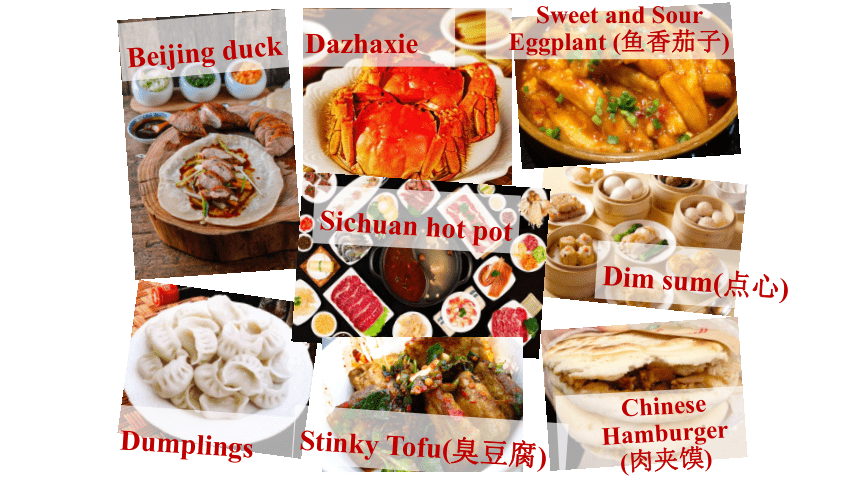
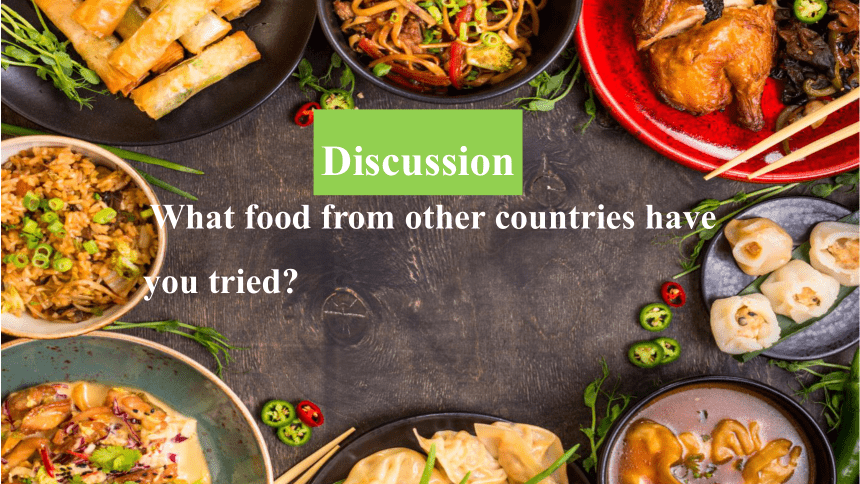

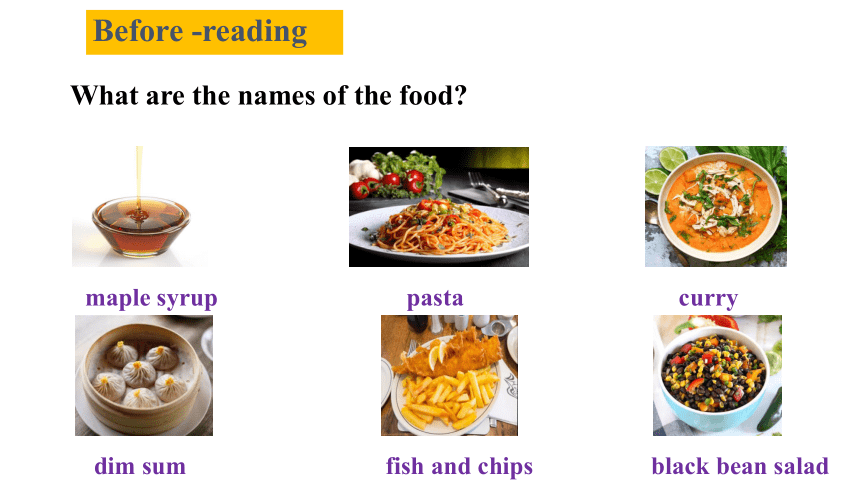

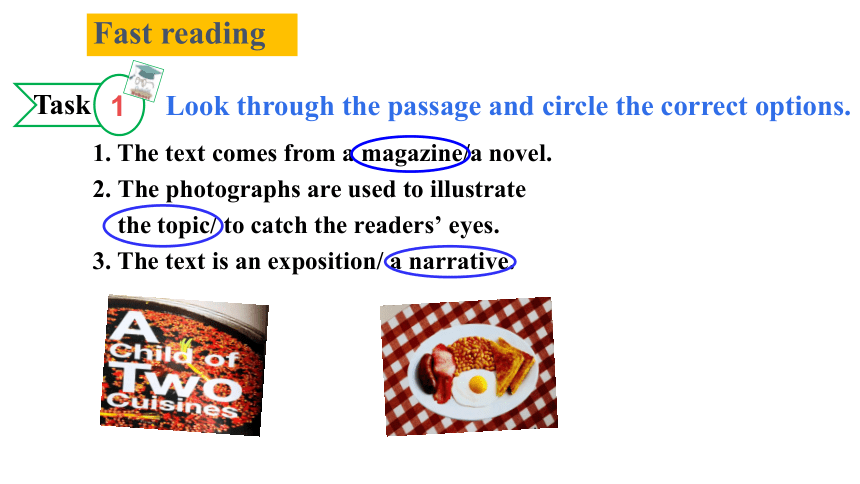
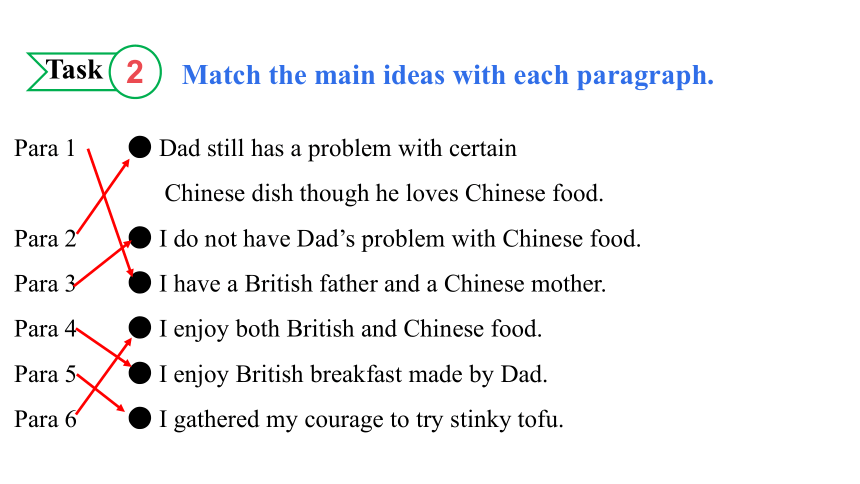
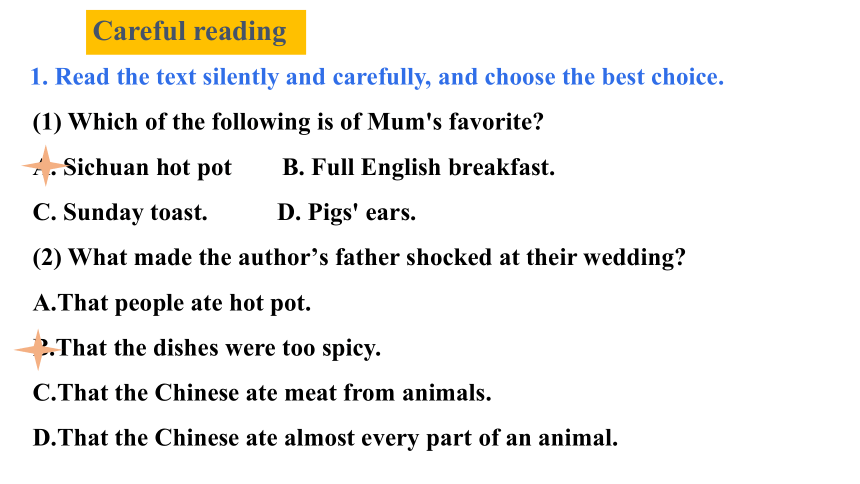

文档简介
(共36张PPT)
Period 1
Starting out & Understanding ideas
Unit 1 Food for thought
Learning aims
1. To grasp the main idea of the passage; 2.To answer the questions about details; 3. To know the food in China and worldwide.
Leading-in
Think:
What is your favorite food
Beijing duck
Dazhaxie
Sweet and Sour Eggplant (鱼香茄子)
Sichuan hot pot
Dumplings
Stinky Tofu(臭豆腐)
Dim sum(点心)
Chinese Hamburger
(肉夹馍)
What food from other countries have you tried
Discussion
A Child of Two Cuisines
Reading Comprehension
What are the names of the food
dim sum
curry
pasta
maple syrup
fish and chips
black bean salad
Before -reading
Match the food with the countries.
Italy
India
Canada
UK
China
Mexico
Task
1
Look through the passage and circle the correct options.
1. The text comes from a magazine/a novel.
2. The photographs are used to illustrate
the topic/ to catch the readers’ eyes.
3. The text is an exposition/ a narrative.
Fast reading
Task
2
Match the main ideas with each paragraph.
Para 1 ● Dad still has a problem with certain
Chinese dish though he loves Chinese food.
Para 2 ● I do not have Dad’s problem with Chinese food.
Para 3 ● I have a British father and a Chinese mother.
Para 4 ● I enjoy both British and Chinese food.
Para 5 ● I enjoy British breakfast made by Dad.
Para 6 ● I gathered my courage to try stinky tofu.
1. Read the text silently and carefully, and choose the best choice.
(1) Which of the following is of Mum's favorite
A. Sichuan hot pot B. Full English breakfast.
C. Sunday toast. D. Pigs' ears.
(2) What made the author’s father shocked at their wedding
A.That people ate hot pot.
B.That the dishes were too spicy.
C.That the Chinese ate meat from animals.
D.That the Chinese ate almost every part of an animal.
Careful reading
(3) From the second paragraph, we can learn that_____.
A.My dad loves all the Chinese dishes after many years of marriage.
B. My dad has been used to eating chicken feet.
C. Chinese can make dishes using every part of an animal.
D. My grandparents felt surprised when they saw my father for the first time.
(4) The author's father probably dislikes _______.
A. Sichuan hot pot.
B. Full English breakfast.
C. Chicken feet.
D. Sunday roast.
2. Read the passage again and fill in the blanks.
As I am growing up in England with a British father and a Chinese mother, I 1._______________ (enjoy) food from both countries ever since I was very small! Mum comes from Sichuan, and often cooks spicy 2. ______(dish).Though Dad has come to love hot pot, there are still some dishes that Dad dare not eat. He once told me the first time he 3.______ (visit) my mother's parents in China, he was surprised by 4. was served on the table. What shocked him most was that the Chinese ate almost every part of 5.__ animal. Dad can cook a super “full English breakfast”, but Mum says 6. (eat) too much roast food may make us suffer from heat inside our bodies.
have enjoyed
dishes
visited
what
an
eating
When I visited China for the first time, Mum encouraged me 7. ______(try) different kinds of food, and I did! I really enjoyed the food.But when I came 8. stinky tofu, I first hesitated and then gathered all my courage to take a bite and was 9. _______ (amaze) to find it wasn't so bad. People say that one man's meat is another man's poison, but I feel at home with food from both my cultures. In my opinion, there's nothing 10. (good) than a cross-cultural afternoon tea of English biscuits and a cup of Chinese oolong tea in a fine china cup!
to try
across
amazed
better
Pairwork
After -reading
Discuss the questions below.
1. How do you understand “ one man's meat is another man's poison”
2. Do you know any sayings about food in Chinese
It means that something that one person likes may not be liked by someone else. Similar sayings in Chinese include “萝卜青菜,各有所爱”, etc.
1. take to (尤指短时间内)喜欢上,养成做某事的习惯
(2020·全国Ⅰ卷)The first, which I take to reading every spring, is Ernest Hemingway’s A Moveable Feast. 我每年春天都会读的第一本书是海明威的《可移动的盛宴》。
Language points
【知识归纳】
【即学即练】
(1)He has recently taken to ______ (stay) in bed of a Sunday morning.
(2)I am sorry to have taken ____ so much of your time.
(3)It is certain that when Mr.Green retires, his son will take ____ the business from him.
(4)I couldn't take ___ the professor's lecture at all. It was too difficult for me.
up
staying
over
in
2. be shocked by/at... 对……感到震惊
(2020·天津高考 )Jones was shocked when she said that she didn’t actually mind being cheated. 当她说她其实并不介意被欺骗时,琼斯感到震惊。
shock vt.& vi.(使)震惊;震动 n.休克;打击;震惊
be a shock to... 使……震惊
shocked adj.感到震惊的
be shocked to do sth.因做某事而感到震惊
be shocked that... 对……感到震惊
shocking adj.令人震惊的
【知识归纳】
【即学即练】单句语法填空
(1)I was shocked _________(hear) the news that he had been fired.
(2)The ending of this play is very ________(shock).
一句多译
这个消息让会上的人们很是震惊。
①The news made ________________________________.
②The people at the meeting ________________________.
to hear
shocking
the people at the meeting very shocked
were shocked at/by the news
3. sort n.种类;方式 v.分类;挑选
(2022·北京高考)This is the sort of hype that annoys Johnson.
这种炒作惹恼了约翰逊。
【知识归纳】
sort out 分类;整理;(从……中)挑选出
sort out...from... 把……从……中挑选/辨别出来
a sort of 一种
all sorts of 各种各样的
sort of 有点儿,有几分;稍微(作副词用,修饰其 后的形容词和动词)
【即学即练】
(1)We must ________________________ the bad ones.
咱们得把好的苹果拣出来,同坏的那些分开。
(2)There are _________ flowers in the garden in the center of the city.
在城市中心的花园里有各种各样的花。
(3)He looked ____________________ and left the cinema without finishing it.
他看上去对这部电影有点厌烦,没看完就离开了电影院。
sort out the good apples from
all sorts of
sort of bored with the film
4. typical adj.典型的,有代表性的
(2020·新高考全国Ⅰ卷)Jennifer Mauer has needed more willpower than the typical college students to pursue her goal of earning a nursing degree.詹妮弗·摩尔需要比普通大学生更大的意志力来追求获得护理学位的目标。
【知识归纳】
be typical of 典型的,特有的
It is typical of sb. to do sth. 某人做某事是经常的;某人一贯好做某事。
typically adv.通常,一般;典型地;果然
【即学即练】
(1)_________(typical),he would come late and then say that he had to
go early.
通常,他来得很晚但又总是说他得早走。
(2) It was typical _____ _____ _____ _____ a twenty-minute speech.
发表长约20分钟的演说是他的典型习惯。
(3) Suspiciousness and a quick temper ______ ______ ______ this
emotional style.
怀疑和暴脾气是这种情感类型的典型特征。
Typically
of him to give
are typical of
5. suffer from 遭受;忍受;患病
(2020·江苏高考 ) Later, he worked in Africa, where many people suffered from blindness for lack of proper treatment.后来,他在非洲工作,那里的许多人因为缺乏适当的治疗而失明。
【知识归纳】
suffer vt.& vi.遭受,蒙受;受苦;感到疼痛
suffer loss/pain 遭受损失/痛苦
suffering n.痛苦,疼痛;苦难;折磨
sufferer n.患病者;受苦者
【温馨提示】(1)suffer指遭受抽象的损害、痛苦等,如:suffer pain/defeat/losses/the result/side effects“遭受痛苦/失败/损失/(承受)结果/副作用”。
(2)suffer from常加具体的表示不幸或痛苦的名词,如:遭受战争、自然灾害、疾病带来的痛苦。
【即学即练】
(1)The Red Cross gave food and clothing to the _______ (suffer) in the
earthquake.
红十字会给地震中的受难者发放食物和衣服。
(2) _____________ (suffer) from heart trouble for many years, he takes
some medicine wherever he goes.
由于患有多年的心脏病,他无论走到哪里都要吃药。
sufferers
Having suffered
(3)This war has brought great ________ (suffer) to tens of
thousands of people.
这场战争给成千上万的人们带来巨大的苦难。
(4)The patient said that __________________ a bad back.
那个病人说他患过背疼。
suffering
he had suffered from
6. ever since “自那以后”; 用作时间状语,可以单独使用,也可以接名词或句子作宾语。
(2022 全国乙卷)Ever since her childhood, Ginni, now 71, has had a deep love for travel.
今年71岁的吉妮从小就对旅行有着深深的热爱。
【知识归纳】
(1)ever since的用法和since完全一致,它们之后的从句要用一般过去时,主句要用现在完成时。
(2)It is/has been+一段时间+since...意为“自从……以来已经多久了”,since后面的句子用一般过去时;如前面是It was+一段时间,since...后面的句子要用过去完成时。
It is three years since his brother joined the army.
他哥哥参军三年了。
It was ten years since he had left his hometown.
他离开家乡十年了。
【即学即练】
(1)Ever since then,I ___________(find) smile is the best way to make
us happy.
从那以后,我发现微笑是让我们快乐的最好方式。
(2)_____ _____ _____ ______ ever since we were at school.
自从在学校时起,我们就是朋友。
(3)_____ _____ _____ _____ _____ _____, I have had an affection
for dogs and cats.
我从小时候起就喜欢小猫和小狗。
We have been friends
Ever since I was a child
have found
7. nothing better than 没有……比…….更好的了
I have never spent a more worrying day.我从来没有经历过比这更令人担忧的一天了。
【知识归纳】
(1)nothing better than为形容词的比较级与否定词连用,表达最高级的含义。常用的否定词有:no,not,never,nothing,nobody,hardly等,其意义为“再也没有……比这更……的了”。
(2)can/could+never/not...enough/too... 再……也不过分。
【即学即练】
better
too
couldn’t be better
1.suffer: suffer from;suffer loss/pain
2.typical: be typical of
3.related: be related to
4.addict: be addicted to
5.differ: differ from, be different from
1.marriage→marry
2.typical→typically
3.suffer→suffering→sufferer
4.horrible→horribly
5.poison →poisonous
sort,
super,
gather,
bite,
function, opinion,
download
词 汇 清 单
认知词汇
拓展词汇
应用词汇
核心短语
thanks to;
take to doing;
suffer from;
deal with;
come across;
remind sb. of sth.;
fall in love with;
feel at home
重点句式
I’ve enjoyed food from both countries ever since I was able to hold a knife and fork-and chopsticks!(ever since)
Ⅰ.单词拼写(根据首字母或汉语提示拼写单词)
1. Strictly speaking, your o________ isn't the same with mine.
2. People slowly g______ their belongs and left the hall.
3. It is said that the fiece shark _____(咬) him.
4. Many people think of purple as a ______(象征) of romance.
5. Phones make it more __________(方便的) for people to make contact
with relatives and friends.
pinion
athered
bit
symbol
convenient
Ⅱ.完成句子
1. _________________ to let others wait for him.
让别人等他是汤姆的典型作风。
2. Many people __________________________ and lost their lives.
许多人被这种可怕的疾病夺去了生命。
3. The photo ___________________ when we were together.
这张照片让我想起了我们在一起的日子。
4. ______________, I have found smile is the best way to make us happy.
从那以后,我发现微笑是让我们快乐的最好方式。
It is typical of Tom
suffered from this terrible disease
reminded me of the days
Ever since then
Health is certainly more valuable than money,
because it is by health that money is procured. — Samuel Johnson
健康当然比金钱更为重要,因为我们所赖以获得金钱的就是健康。
——塞缪尔·约翰逊
Period 1
Starting out & Understanding ideas
Unit 1 Food for thought
Learning aims
1. To grasp the main idea of the passage; 2.To answer the questions about details; 3. To know the food in China and worldwide.
Leading-in
Think:
What is your favorite food
Beijing duck
Dazhaxie
Sweet and Sour Eggplant (鱼香茄子)
Sichuan hot pot
Dumplings
Stinky Tofu(臭豆腐)
Dim sum(点心)
Chinese Hamburger
(肉夹馍)
What food from other countries have you tried
Discussion
A Child of Two Cuisines
Reading Comprehension
What are the names of the food
dim sum
curry
pasta
maple syrup
fish and chips
black bean salad
Before -reading
Match the food with the countries.
Italy
India
Canada
UK
China
Mexico
Task
1
Look through the passage and circle the correct options.
1. The text comes from a magazine/a novel.
2. The photographs are used to illustrate
the topic/ to catch the readers’ eyes.
3. The text is an exposition/ a narrative.
Fast reading
Task
2
Match the main ideas with each paragraph.
Para 1 ● Dad still has a problem with certain
Chinese dish though he loves Chinese food.
Para 2 ● I do not have Dad’s problem with Chinese food.
Para 3 ● I have a British father and a Chinese mother.
Para 4 ● I enjoy both British and Chinese food.
Para 5 ● I enjoy British breakfast made by Dad.
Para 6 ● I gathered my courage to try stinky tofu.
1. Read the text silently and carefully, and choose the best choice.
(1) Which of the following is of Mum's favorite
A. Sichuan hot pot B. Full English breakfast.
C. Sunday toast. D. Pigs' ears.
(2) What made the author’s father shocked at their wedding
A.That people ate hot pot.
B.That the dishes were too spicy.
C.That the Chinese ate meat from animals.
D.That the Chinese ate almost every part of an animal.
Careful reading
(3) From the second paragraph, we can learn that_____.
A.My dad loves all the Chinese dishes after many years of marriage.
B. My dad has been used to eating chicken feet.
C. Chinese can make dishes using every part of an animal.
D. My grandparents felt surprised when they saw my father for the first time.
(4) The author's father probably dislikes _______.
A. Sichuan hot pot.
B. Full English breakfast.
C. Chicken feet.
D. Sunday roast.
2. Read the passage again and fill in the blanks.
As I am growing up in England with a British father and a Chinese mother, I 1._______________ (enjoy) food from both countries ever since I was very small! Mum comes from Sichuan, and often cooks spicy 2. ______(dish).Though Dad has come to love hot pot, there are still some dishes that Dad dare not eat. He once told me the first time he 3.______ (visit) my mother's parents in China, he was surprised by 4. was served on the table. What shocked him most was that the Chinese ate almost every part of 5.__ animal. Dad can cook a super “full English breakfast”, but Mum says 6. (eat) too much roast food may make us suffer from heat inside our bodies.
have enjoyed
dishes
visited
what
an
eating
When I visited China for the first time, Mum encouraged me 7. ______(try) different kinds of food, and I did! I really enjoyed the food.But when I came 8. stinky tofu, I first hesitated and then gathered all my courage to take a bite and was 9. _______ (amaze) to find it wasn't so bad. People say that one man's meat is another man's poison, but I feel at home with food from both my cultures. In my opinion, there's nothing 10. (good) than a cross-cultural afternoon tea of English biscuits and a cup of Chinese oolong tea in a fine china cup!
to try
across
amazed
better
Pairwork
After -reading
Discuss the questions below.
1. How do you understand “ one man's meat is another man's poison”
2. Do you know any sayings about food in Chinese
It means that something that one person likes may not be liked by someone else. Similar sayings in Chinese include “萝卜青菜,各有所爱”, etc.
1. take to (尤指短时间内)喜欢上,养成做某事的习惯
(2020·全国Ⅰ卷)The first, which I take to reading every spring, is Ernest Hemingway’s A Moveable Feast. 我每年春天都会读的第一本书是海明威的《可移动的盛宴》。
Language points
【知识归纳】
【即学即练】
(1)He has recently taken to ______ (stay) in bed of a Sunday morning.
(2)I am sorry to have taken ____ so much of your time.
(3)It is certain that when Mr.Green retires, his son will take ____ the business from him.
(4)I couldn't take ___ the professor's lecture at all. It was too difficult for me.
up
staying
over
in
2. be shocked by/at... 对……感到震惊
(2020·天津高考 )Jones was shocked when she said that she didn’t actually mind being cheated. 当她说她其实并不介意被欺骗时,琼斯感到震惊。
shock vt.& vi.(使)震惊;震动 n.休克;打击;震惊
be a shock to... 使……震惊
shocked adj.感到震惊的
be shocked to do sth.因做某事而感到震惊
be shocked that... 对……感到震惊
shocking adj.令人震惊的
【知识归纳】
【即学即练】单句语法填空
(1)I was shocked _________(hear) the news that he had been fired.
(2)The ending of this play is very ________(shock).
一句多译
这个消息让会上的人们很是震惊。
①The news made ________________________________.
②The people at the meeting ________________________.
to hear
shocking
the people at the meeting very shocked
were shocked at/by the news
3. sort n.种类;方式 v.分类;挑选
(2022·北京高考)This is the sort of hype that annoys Johnson.
这种炒作惹恼了约翰逊。
【知识归纳】
sort out 分类;整理;(从……中)挑选出
sort out...from... 把……从……中挑选/辨别出来
a sort of 一种
all sorts of 各种各样的
sort of 有点儿,有几分;稍微(作副词用,修饰其 后的形容词和动词)
【即学即练】
(1)We must ________________________ the bad ones.
咱们得把好的苹果拣出来,同坏的那些分开。
(2)There are _________ flowers in the garden in the center of the city.
在城市中心的花园里有各种各样的花。
(3)He looked ____________________ and left the cinema without finishing it.
他看上去对这部电影有点厌烦,没看完就离开了电影院。
sort out the good apples from
all sorts of
sort of bored with the film
4. typical adj.典型的,有代表性的
(2020·新高考全国Ⅰ卷)Jennifer Mauer has needed more willpower than the typical college students to pursue her goal of earning a nursing degree.詹妮弗·摩尔需要比普通大学生更大的意志力来追求获得护理学位的目标。
【知识归纳】
be typical of 典型的,特有的
It is typical of sb. to do sth. 某人做某事是经常的;某人一贯好做某事。
typically adv.通常,一般;典型地;果然
【即学即练】
(1)_________(typical),he would come late and then say that he had to
go early.
通常,他来得很晚但又总是说他得早走。
(2) It was typical _____ _____ _____ _____ a twenty-minute speech.
发表长约20分钟的演说是他的典型习惯。
(3) Suspiciousness and a quick temper ______ ______ ______ this
emotional style.
怀疑和暴脾气是这种情感类型的典型特征。
Typically
of him to give
are typical of
5. suffer from 遭受;忍受;患病
(2020·江苏高考 ) Later, he worked in Africa, where many people suffered from blindness for lack of proper treatment.后来,他在非洲工作,那里的许多人因为缺乏适当的治疗而失明。
【知识归纳】
suffer vt.& vi.遭受,蒙受;受苦;感到疼痛
suffer loss/pain 遭受损失/痛苦
suffering n.痛苦,疼痛;苦难;折磨
sufferer n.患病者;受苦者
【温馨提示】(1)suffer指遭受抽象的损害、痛苦等,如:suffer pain/defeat/losses/the result/side effects“遭受痛苦/失败/损失/(承受)结果/副作用”。
(2)suffer from常加具体的表示不幸或痛苦的名词,如:遭受战争、自然灾害、疾病带来的痛苦。
【即学即练】
(1)The Red Cross gave food and clothing to the _______ (suffer) in the
earthquake.
红十字会给地震中的受难者发放食物和衣服。
(2) _____________ (suffer) from heart trouble for many years, he takes
some medicine wherever he goes.
由于患有多年的心脏病,他无论走到哪里都要吃药。
sufferers
Having suffered
(3)This war has brought great ________ (suffer) to tens of
thousands of people.
这场战争给成千上万的人们带来巨大的苦难。
(4)The patient said that __________________ a bad back.
那个病人说他患过背疼。
suffering
he had suffered from
6. ever since “自那以后”; 用作时间状语,可以单独使用,也可以接名词或句子作宾语。
(2022 全国乙卷)Ever since her childhood, Ginni, now 71, has had a deep love for travel.
今年71岁的吉妮从小就对旅行有着深深的热爱。
【知识归纳】
(1)ever since的用法和since完全一致,它们之后的从句要用一般过去时,主句要用现在完成时。
(2)It is/has been+一段时间+since...意为“自从……以来已经多久了”,since后面的句子用一般过去时;如前面是It was+一段时间,since...后面的句子要用过去完成时。
It is three years since his brother joined the army.
他哥哥参军三年了。
It was ten years since he had left his hometown.
他离开家乡十年了。
【即学即练】
(1)Ever since then,I ___________(find) smile is the best way to make
us happy.
从那以后,我发现微笑是让我们快乐的最好方式。
(2)_____ _____ _____ ______ ever since we were at school.
自从在学校时起,我们就是朋友。
(3)_____ _____ _____ _____ _____ _____, I have had an affection
for dogs and cats.
我从小时候起就喜欢小猫和小狗。
We have been friends
Ever since I was a child
have found
7. nothing better than 没有……比…….更好的了
I have never spent a more worrying day.我从来没有经历过比这更令人担忧的一天了。
【知识归纳】
(1)nothing better than为形容词的比较级与否定词连用,表达最高级的含义。常用的否定词有:no,not,never,nothing,nobody,hardly等,其意义为“再也没有……比这更……的了”。
(2)can/could+never/not...enough/too... 再……也不过分。
【即学即练】
better
too
couldn’t be better
1.suffer: suffer from;suffer loss/pain
2.typical: be typical of
3.related: be related to
4.addict: be addicted to
5.differ: differ from, be different from
1.marriage→marry
2.typical→typically
3.suffer→suffering→sufferer
4.horrible→horribly
5.poison →poisonous
sort,
super,
gather,
bite,
function, opinion,
download
词 汇 清 单
认知词汇
拓展词汇
应用词汇
核心短语
thanks to;
take to doing;
suffer from;
deal with;
come across;
remind sb. of sth.;
fall in love with;
feel at home
重点句式
I’ve enjoyed food from both countries ever since I was able to hold a knife and fork-and chopsticks!(ever since)
Ⅰ.单词拼写(根据首字母或汉语提示拼写单词)
1. Strictly speaking, your o________ isn't the same with mine.
2. People slowly g______ their belongs and left the hall.
3. It is said that the fiece shark _____(咬) him.
4. Many people think of purple as a ______(象征) of romance.
5. Phones make it more __________(方便的) for people to make contact
with relatives and friends.
pinion
athered
bit
symbol
convenient
Ⅱ.完成句子
1. _________________ to let others wait for him.
让别人等他是汤姆的典型作风。
2. Many people __________________________ and lost their lives.
许多人被这种可怕的疾病夺去了生命。
3. The photo ___________________ when we were together.
这张照片让我想起了我们在一起的日子。
4. ______________, I have found smile is the best way to make us happy.
从那以后,我发现微笑是让我们快乐的最好方式。
It is typical of Tom
suffered from this terrible disease
reminded me of the days
Ever since then
Health is certainly more valuable than money,
because it is by health that money is procured. — Samuel Johnson
健康当然比金钱更为重要,因为我们所赖以获得金钱的就是健康。
——塞缪尔·约翰逊
